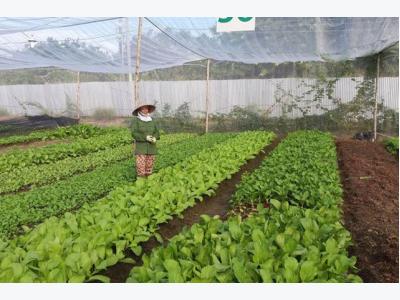Credit and land policies for agriculture should be loosened

HANOI – Leaders of the Ministry of Agriculture and Rural Development have asked the National Assembly (NA) to relax credit and land policies for agriculture to guarantee its sustainable development.
A farmer is seen inside a rooftop veggie farm in this file photo. The Ministry of Agriculture and Rural Development has asked the National Assembly (NA) to relax credit and land policies for agriculture - PHOTO: TL
Speaking at a working session with a NA delegation led by vice chairman Phung Quoc Hien last week, Deputy Minister Le Quoc Doanh said the sector remains highly vulnerable to climate change, small-scale production and heavy dependence on the unpredictable Chinese market.
Vegetables, coffee, pepper, cashew and rubber have brought billions of U.S. dollars in export revenue but State investment in infrastructure and irrigation systems for these products has not been as big as that in rice, Doanh said. Therefore, he proposed, this issue should be dealt with.
Land should be allowed to be amassed to cultivate short-term and perennial crops of higher economic value, he said.
Hoang Thanh Van, director of the ministry's Department of Animal Husbandry, said owners of livestock farms are more inclined to adopt small-scale production because it is difficult to secure as much land as needed and the duration of land use is short. This is a huge impediment to scientific and technological development in livestock farming, and improvement of product quality.
He suggested extending the duration of land use, allowing investors to amass arable land for large-scale farming, and granting longer land leases.
In recent years, a couple of major local companies have established their own research and development centers, such as dairy processor TH Group and feed producer Dabaco Group, but they have got little policy support, Van said, adding credit and tax policy incentives should be extended to them
Minister Nguyen Xuan Cuong told the delegation that the NA should amend the 2013 Land Law in a way that facilitates land accumulation, large-scale farming, transfer of agricultural land, and conversion of land use purposes among rice, annual trees, livestock and aquaculture.
Credit policy should be improved in a way that prioritizes lending to high-tech agriculture and private sector investment.
NA vice chairman Phung Quoc Hien threw his support behind the idea of allowing investors to amassing land to develop large-scale farms, saying the Land Law should be revised to prop up large-scale farming.
He warned domestic agriculture is heavily dependent on China while Chinese trade policy is highly unpredictable. "Farm goods like pigs would take a big hit whenever China changes trade policy or Chinese traders resort to price manipulation tactics. A bumper crop is always accompanied by a price plunge or vice versa."
Instead of only focusing on China, the sector should diversify its foreign markets, especially those requiring high standards, while paying due attention to the growing middle class in Vietnam as this group of consumers is ready to pay high prices for organic farm products, Hien noted.
The sector, he stressed, has no other choice but to adopt advanced science and technology to turn out high-quality products for local and export sale.
Related news
 Agricultural enterprises actively participate in National Single Window
Agricultural enterprises actively participate in National Single Window Officially joined from June 2015, so far MARD has had 9 administrative procedures applied to NSW, which brings lots of advantages for enterprises
 Exports still meet difficulties
Exports still meet difficulties Vietnam's export activity is forecast to meet many difficulties since importing countries tend to erect non-tariff barriers to protect the post Free Trade Agree
 Vietnam's Jan-Feb rice export volume dips, value slides faster
Vietnam's Jan-Feb rice export volume dips, value slides faster Rice export turnover in the first two months falls around 40 percent from a year ago, quickening from a 34 percent slide in January.